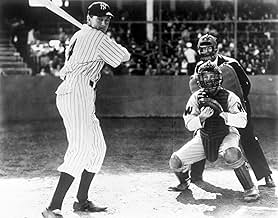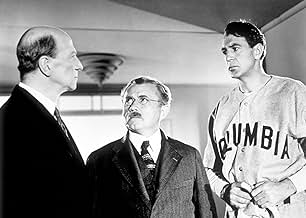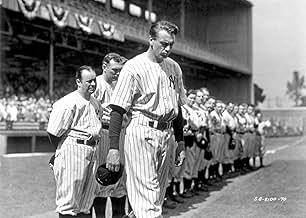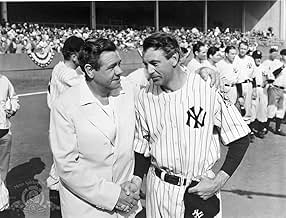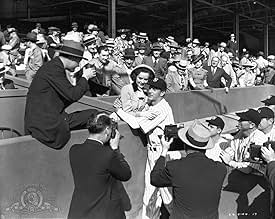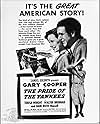IMDb-BEWERTUNG
7,6/10
12.560
IHRE BEWERTUNG
Die Geschichte über das Leben und die Karriere des berühmten Baseballspielers Lou Gehrig.Die Geschichte über das Leben und die Karriere des berühmten Baseballspielers Lou Gehrig.Die Geschichte über das Leben und die Karriere des berühmten Baseballspielers Lou Gehrig.
- 1 Oscar gewonnen
- 5 Gewinne & 10 Nominierungen insgesamt
Ludwig Stössel
- Pop Gehrig
- (as Ludwig Stossel)
Bob Meusel
- Robert W. Meusel
- (as Robert W. Meusel)
Empfohlene Bewertungen
In today's era of greedy athletes and their employers, the story of Lou Gehrig seems almost quaint. Here's a young man who by all accounts was selfless, kind-hearted, and rather introverted. And, of course, it didn't hurt that he was also a very good baseball player too. Put him on a lineup card today and he might not be the same player. Up until a few years ago, Gehrig's record of 2,130 consecutive games played was a record, a record that many thought would stand forever. For 16 years he was in the lineup as the Yankees' first baseman, never asking out for any reason. That alone should show you how special a person Gehrig was.
This biography is pretty straightforward. Unlike many of its kind, it doesn't show its protagonist somehow succeeding against all odds. Gehrig didn't have an abusive mother, he wasn't beaten up by kids at school, he wasn't learning-disabled, he didn't have attention-deficit disorder, he didn't come from abject poverty. He was simply a son in a working-class, immigrant family, as many were during the early decades of this century. And that's why Gehrig is so special to so many people - he symbolises their own hopes.
Gary Cooper is aces as Gehrig, and Teresa Wright is wonderful as his wife, Eleanor. If there's anything imperfect about the movie, it's that it is...well, a little predictable. That's something biopics can't avoid, of course, so it's no big problem. But even if most of the film doesn't impress you, the final speech at Yankee Stadium - when Gehrig was suffering visibly from the disease that would eventually be named after him - will move you past tears. And even better, when Gehrig's done his brief speech, he walks offscreen. If that movie were written today, he'd play another game and hit a game-winning home run. It's this film's honesty and sincerity that win you over.
This biography is pretty straightforward. Unlike many of its kind, it doesn't show its protagonist somehow succeeding against all odds. Gehrig didn't have an abusive mother, he wasn't beaten up by kids at school, he wasn't learning-disabled, he didn't have attention-deficit disorder, he didn't come from abject poverty. He was simply a son in a working-class, immigrant family, as many were during the early decades of this century. And that's why Gehrig is so special to so many people - he symbolises their own hopes.
Gary Cooper is aces as Gehrig, and Teresa Wright is wonderful as his wife, Eleanor. If there's anything imperfect about the movie, it's that it is...well, a little predictable. That's something biopics can't avoid, of course, so it's no big problem. But even if most of the film doesn't impress you, the final speech at Yankee Stadium - when Gehrig was suffering visibly from the disease that would eventually be named after him - will move you past tears. And even better, when Gehrig's done his brief speech, he walks offscreen. If that movie were written today, he'd play another game and hit a game-winning home run. It's this film's honesty and sincerity that win you over.
A touching and emotional experience about the life of late-New York Yankees first baseman Lou Gehrig (played brilliantly by the always excellent Gary Cooper, Oscar-nominated). By 1939 Gehrig was saying farewell to baseball prematurely due to a rare muscle disorder that today bears the hero's name. Shortly after Gehrig's famous speech, he would indeed pass away. "The Pride of the Yankees" (made less than three years after his death) is a moving tribute that is first-class in every way imaginable. We meet the character as a young boy whose strict mother wants him to be an engineer. As the years pass though he cannot deny his love of the grand old game. Sportswriter Walter Brennan (who was always outstanding as well) becomes the biggest supporter of Gehrig, even though Gehrig seems out-of-place in the big city at times and seems more concerned about baseball than anything else (which bothers some inside of the Yankees circle, mainly due to Babe Ruth's famous antics). As the years pass, championships come and a constant is always Gehrig who set a record with 2,130 consecutive games played (Cal Ripken, Jr. would later break that record in 1995). He finds love with a young woman from Chicago (Oscar-nominee Teresa Wright) and it appears that happiness is all that the couple will experience. Sadly that would not be the case though. Sam Wood's heart-felt direction and a focused screenplay (which is a bit sappy at times) just add an odd element of grace that endears the film to most all movie-goers. Babe Ruth does play himself here and is a surprisingly excellent performer who allows himself to be taken out of the spotlight to tell Gehrig's story. He ends up being a really solid supporting actor. I do admit that "The Pride of the Yankees" is slightly flawed. Some things seem a bit staged (most notably the young child in the hospital), but overall the film is right on target. Anyone who loves baseball, loves movies and has feelings (whether good, bad or indifferent) about the Yankees should definitely give "The Pride of the Yankees" an at-bat. It is a stunning experience that is suitable for the whole family and teaches the whole audience about love, friendship, compassion, life, death and heroism. 4.5 out of 5 stars.
First off, my favorite actor of all time is Gary Cooper. I love his acting style, the gawkiness he often used in his screen roles, in addition of course to the fact that I thought he was absolutely gorgeous, in his prime (when he was in his 30's and 40's). Cooper's appeal is only enhanced, for me, by the distance of his on screen persona from his real-life one...he was quite the ladies' man in real life, not awkward with women as the characters he often portrayed on screen, and his smoldering sexuality shows from his piercing blue eyes. His lively offscreen affairs with stars such as Clara Bow (who famously declared "He's hung like a horse and he can go all night!"), Lupe Velez aka "The Mexican Spitfire", and of course Patricia Neal, are the stuff of old Hollywood legend.
Kevin Costner and Ralph Fiennes in their primes had nothing' on Coop. He was the man. Cooper, who started off wanting to be an artist, fell into acting instead, first as a stunt man in westerns, but quickly getting leading roles. He continued to do most of his own riding and stunts even into his later years, carving himself quite a name as a star of westerns, including the western classic "High Noon" (1952), but my favorite films of his were films such as "Mr. Deeds Goes To Town" (1936), "Meet John Doe" (1941), "Ball Of Fire" (1941), "Sargeant York" (1941), and of course "The Pride Of The Yankees". My husband understands my adoration of Gary Cooper; and/but we had this brief discussion before we watched my recently purchased DVD of the film (I'd seen it before, but didn't own a copy of it):
Husband: "I don't mind watching it with you as long as you don't make those noises you always make when you watch a Gary Cooper movie."
Me: "What noises?"
Husband: "Those noises like the ones Homer Simpson makes when he looks at a stick of butter...'Mmmmmmmm'...."
Me: "What? I didn't know I did that. Okay, I won't make any weird noises while we watch it."
So I was quiet (except for of course choking up in tears when Cooper delivers Gehrig's legendary "Today, I consider myself to be the luckiest man on the face of the earth" farewell speech). Gehrig's retirement speech helped immortalize him as a hero and an all-American role model.
"The Pride of the Yankees" is the blueprint for the sports biopic, and is generally considered to be the best movie about baseball ever made. Teresa Wright stars as his wife Eleanor. Wright, who just passed away this March, was an excellent actress, and a beautiful woman. The last film I saw her in was in a small part in "Somewhere In Time", and she had aged wonderfully. She and Cooper had great chemistry on screen, holding her own ground as he towered over her petite 5'3" frame.
Walter Brennan, a frequent Cooper co-star and real-life friend, and Babe Ruth as himself are two other co-stars who contribute much to the film.
The film traces the rags-to-riches story of Gehrig, as his childhood dream comes true when he's signed to the New York Yankees, and his untimely retirement when he is stricken with the fatal, neurological disease ALS (amyotrophic lateral sclerosis) which was afterwards simply called "Lou Gehrig's Disease". Cooper, although a bit of an odd choice for the part (one reason being his height, he was about 6'4"), gives an endearing, heartfelt, dignified performance, for which he was nominated for an Academy Award. Gehrig was left-handed, Cooper right-handed, which was further complicated by the fact that Cooper himself wasn't a capable baseball player. For the filming, his uniform had "New York" printed backwards on it, he ran to third base when he hit a ball, and then the print was reversed.
Nominated for 11 Academy Awards in all, and receiving 1 (for Film Editing), "The Pride Of The Yankees" still stands as a must-see film for baseball fans and fans of classic cinema alike.
Kevin Costner and Ralph Fiennes in their primes had nothing' on Coop. He was the man. Cooper, who started off wanting to be an artist, fell into acting instead, first as a stunt man in westerns, but quickly getting leading roles. He continued to do most of his own riding and stunts even into his later years, carving himself quite a name as a star of westerns, including the western classic "High Noon" (1952), but my favorite films of his were films such as "Mr. Deeds Goes To Town" (1936), "Meet John Doe" (1941), "Ball Of Fire" (1941), "Sargeant York" (1941), and of course "The Pride Of The Yankees". My husband understands my adoration of Gary Cooper; and/but we had this brief discussion before we watched my recently purchased DVD of the film (I'd seen it before, but didn't own a copy of it):
Husband: "I don't mind watching it with you as long as you don't make those noises you always make when you watch a Gary Cooper movie."
Me: "What noises?"
Husband: "Those noises like the ones Homer Simpson makes when he looks at a stick of butter...'Mmmmmmmm'...."
Me: "What? I didn't know I did that. Okay, I won't make any weird noises while we watch it."
So I was quiet (except for of course choking up in tears when Cooper delivers Gehrig's legendary "Today, I consider myself to be the luckiest man on the face of the earth" farewell speech). Gehrig's retirement speech helped immortalize him as a hero and an all-American role model.
"The Pride of the Yankees" is the blueprint for the sports biopic, and is generally considered to be the best movie about baseball ever made. Teresa Wright stars as his wife Eleanor. Wright, who just passed away this March, was an excellent actress, and a beautiful woman. The last film I saw her in was in a small part in "Somewhere In Time", and she had aged wonderfully. She and Cooper had great chemistry on screen, holding her own ground as he towered over her petite 5'3" frame.
Walter Brennan, a frequent Cooper co-star and real-life friend, and Babe Ruth as himself are two other co-stars who contribute much to the film.
The film traces the rags-to-riches story of Gehrig, as his childhood dream comes true when he's signed to the New York Yankees, and his untimely retirement when he is stricken with the fatal, neurological disease ALS (amyotrophic lateral sclerosis) which was afterwards simply called "Lou Gehrig's Disease". Cooper, although a bit of an odd choice for the part (one reason being his height, he was about 6'4"), gives an endearing, heartfelt, dignified performance, for which he was nominated for an Academy Award. Gehrig was left-handed, Cooper right-handed, which was further complicated by the fact that Cooper himself wasn't a capable baseball player. For the filming, his uniform had "New York" printed backwards on it, he ran to third base when he hit a ball, and then the print was reversed.
Nominated for 11 Academy Awards in all, and receiving 1 (for Film Editing), "The Pride Of The Yankees" still stands as a must-see film for baseball fans and fans of classic cinema alike.
A lot of non-baseball fans still liked this movie a lot, and that's probably because it's more about a nice guy than it is about a ballplayer. New York Yankee great Lou Gehrig is the subject. Gehrig was often in the shadow of the great Babe Ruth, but was tremendous player in his own right and a far better human being.
It's tough to find many nicer movies than this one: a totally inoffensive, sentimental and old- fashioned film about a super-nice guy, played by a popular actor: Gary Cooper. Except for one sportswriter, there were no villains or nasty people in this movie.
Teresa Wright plays "Eleanor Twitchell," who becomes Gehrig's wife and Walter Brennan plays sportswriter and friend, "Sam Blake." The real Babe Ruth played himself, which was nice to see.
Even though Gehrig died at a fairly young age of a disease now named after him, overall this was a feel-good movie of the highest sort. This was so nice a story that even the cynical critics dared not criticize it. It leaves you with tears in your eyes at the end.
It's tough to find many nicer movies than this one: a totally inoffensive, sentimental and old- fashioned film about a super-nice guy, played by a popular actor: Gary Cooper. Except for one sportswriter, there were no villains or nasty people in this movie.
Teresa Wright plays "Eleanor Twitchell," who becomes Gehrig's wife and Walter Brennan plays sportswriter and friend, "Sam Blake." The real Babe Ruth played himself, which was nice to see.
Even though Gehrig died at a fairly young age of a disease now named after him, overall this was a feel-good movie of the highest sort. This was so nice a story that even the cynical critics dared not criticize it. It leaves you with tears in your eyes at the end.
The only reason I don't give this film a perfect 10 is that I think Gary Cooper was a bit too old to be playing Lou Gehrig as a youth. Cooper was 41 when Pride of the Yankees was made. He was two years older than Lou Gehrig actually was.
While not terribly convincing as a college age Gehrig at Columbia University, the part of Gehrig grew into Cooper as Gehrig aged cinematically. And of course his recreation of Lou Gehrig's farewell to baseball got him an Oscar nomination.
Henry Louis Gehrig, child of German immigrants who grew up in the Yorkville section of Manhattan, was arguably the greatest first baseman baseball has ever known. He certainly has very few competitors for the honor. His famous record of 2130 consecutive games was bettered about a decade ago by Cal Ripken, but he still holds the major league record for lifetime grand-slam home runs, 23 and the American League RBI record for a single season, 184. He is one of a select group of ballplayers to have won the Triple Crown, he did that in 1934. His lifetime batting average of .340 is only topped by a handful.
He was as writer Frank Graham put it, baseball's "quiet hero." Until he was forced from baseball by the disease he gave his name to Gehrig played second fiddle to the flamboyant Babe Ruth and then to a graceful rookie named Joe DiMaggio.
The facts of Gehrig's life are somewhat jumbled in this film for dramatic coherency, but the essence of his character is brought out in the script by Paul Gallico. In fact Gallico wrote himself into the film as sportswriter Sam Blake as played by Walter Brennan.
Gary Cooper and Lou Gehrig and Teresa Wright as Eleanor Twitchell Gehrig both received Oscar nominations for their portrayals.
It should also not be forgotten that Lou Gehrig was a German American and I believe one of the reasons the film was made was that at that time we were fighting Germany. The German American Bund had its following and very much so in Lou Gehrig's Yorkville neighborhood. German Americans certainly had other and better role models than the Bund.
I remember as a lad going to Yankee old-timers games and there was always a moment of reverential silence when the Yankee widows, Claire Hodgson Ruth and Eleanor Twitchell Gehrig were always introduced. Both survived their husbands by many years.
In fact when Teresa Wright died this past year when the roll call of former Yankees who had passed on her name was read out among all the ballplayers. It was a fitting tribute to a great actress and a woman who didn't know a thing about baseball before she did this film, but became a devoted fan afterward. I guess that was her private tribute to Lou Gehrig.
There is still no cure for amytrophic lateral sclerosis or now known as Lou Gehrig's Disease. A lot of other noted persons have passed on from it, Jacob Javits, David Niven, Ezzard Charles, Dennis Day and former Vice President Henry A. Wallace. Still we can hope for a dedicated and inspired scientist to find a cure.
Until then we have this inspirational movie and Lou Gehrig's inspired and remembered life.
While not terribly convincing as a college age Gehrig at Columbia University, the part of Gehrig grew into Cooper as Gehrig aged cinematically. And of course his recreation of Lou Gehrig's farewell to baseball got him an Oscar nomination.
Henry Louis Gehrig, child of German immigrants who grew up in the Yorkville section of Manhattan, was arguably the greatest first baseman baseball has ever known. He certainly has very few competitors for the honor. His famous record of 2130 consecutive games was bettered about a decade ago by Cal Ripken, but he still holds the major league record for lifetime grand-slam home runs, 23 and the American League RBI record for a single season, 184. He is one of a select group of ballplayers to have won the Triple Crown, he did that in 1934. His lifetime batting average of .340 is only topped by a handful.
He was as writer Frank Graham put it, baseball's "quiet hero." Until he was forced from baseball by the disease he gave his name to Gehrig played second fiddle to the flamboyant Babe Ruth and then to a graceful rookie named Joe DiMaggio.
The facts of Gehrig's life are somewhat jumbled in this film for dramatic coherency, but the essence of his character is brought out in the script by Paul Gallico. In fact Gallico wrote himself into the film as sportswriter Sam Blake as played by Walter Brennan.
Gary Cooper and Lou Gehrig and Teresa Wright as Eleanor Twitchell Gehrig both received Oscar nominations for their portrayals.
It should also not be forgotten that Lou Gehrig was a German American and I believe one of the reasons the film was made was that at that time we were fighting Germany. The German American Bund had its following and very much so in Lou Gehrig's Yorkville neighborhood. German Americans certainly had other and better role models than the Bund.
I remember as a lad going to Yankee old-timers games and there was always a moment of reverential silence when the Yankee widows, Claire Hodgson Ruth and Eleanor Twitchell Gehrig were always introduced. Both survived their husbands by many years.
In fact when Teresa Wright died this past year when the roll call of former Yankees who had passed on her name was read out among all the ballplayers. It was a fitting tribute to a great actress and a woman who didn't know a thing about baseball before she did this film, but became a devoted fan afterward. I guess that was her private tribute to Lou Gehrig.
There is still no cure for amytrophic lateral sclerosis or now known as Lou Gehrig's Disease. A lot of other noted persons have passed on from it, Jacob Javits, David Niven, Ezzard Charles, Dennis Day and former Vice President Henry A. Wallace. Still we can hope for a dedicated and inspired scientist to find a cure.
Until then we have this inspirational movie and Lou Gehrig's inspired and remembered life.
Wusstest du schon
- WissenswertesReleased just 17 months after Lou Gehrig's death.
- PatzerAs Gehrig (Cooper) is doing his homework at Columbia, he writes with his right hand. Whilst Gehrig batted and threw left-handed, like many lefties of the era (perhaps because of "correction" in school), he wrote with his right hand.
- Zitate
[last lines]
Lou Gehrig: [his farewell speech]
Lou Gehrig: Today, I consider myself the luckiest man on the face of the earth... play ball!
- Crazy CreditsOpening credits acknowledgment: Appreciation is expressed for the gracious assistance of Eleanor Gehrig (as Mrs. Lou Gehrig) and for the cooperation of Ed Barrow (as Mr. Ed Barrow) and the New York Yankees arranged by Christy Walsh.
- Alternative VersionenA colorized version is available.
- VerbindungenFeatured in Diamonds on the Silver Screen (1992)
- SoundtracksTake Me Out to the Ball Game
(1908) (uncredited)
Music by Albert von Tilzer
Played during the opening credits and often in the score
Top-Auswahl
Melde dich zum Bewerten an und greife auf die Watchlist für personalisierte Empfehlungen zu.
Details
- Erscheinungsdatum
- Herkunftsland
- Sprache
- Auch bekannt als
- Idolo, amante y héroe
- Drehorte
- Produktionsfirma
- Weitere beteiligte Unternehmen bei IMDbPro anzeigen
- Laufzeit1 Stunde 27 Minuten
- Farbe
- Seitenverhältnis
- 1.37 : 1
Zu dieser Seite beitragen
Bearbeitung vorschlagen oder fehlenden Inhalt hinzufügen



